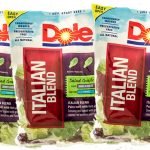Many people have pretty bad habits when it comes to flavoring their foods. They want to add a little enhancing accent, but to do so they automatically reach for the refined table salt. We can all get so much more variety and boost the flavor of our dishes exponentially if we get comfortable using alternative herbs instead. And many of them offer nutritional benefits as well.
To get you started on giving new herbs and spices a try, take advantage of More Herbs, Less Salt Day on August 29th. Created to encourage people to create fresh, nutritious meals at home, this holiday is all about putting away the refined salt for a while and experimenting with a range of herbs—grown at home or bought fresh—that can dazzle your taste buds, enrich your cooking, and provide some healthy advantages too.
We’ll get you started with a listing of six wonderful herbs for flavoring your dishes, but don’t be afraid to expand your horizons and try others as you get more comfortable experimenting.
Cilantro
A flavorful herb often used in Mexican recipes including those for guacamole and salsa, cilantro is rich in vitamin K and calcium. That means it can contribute to bone strength, which is essential since we begin losing bone mass once we’re in our 30s. Plus, cilantro contains quercetin, a flavonoid that help protect the body from oxidative stress damage. Add cilantro to nearly any dish that includes avocado, try it on seafood, or mix it into a pesto recipe. It also draws heavy metals out of your body, which is why Jon Barron uses it in his chelation formula.
Cinnamon
With a delicious, bold flavor, cinnamon is a favorite topping for lots of warm drinks and desserts. But it is also so much more. Cinnamon is full of cinnemaldehyde, a compound that helps reduce inflammation and lower blood sugar levels. In fact, a 2011 study at the University of California, Davis found that cinnamon can reduce fasting blood sugar levels by approximately five percent in people with type 2 diabetes and prediabetes.1 Davis, PA and Yokoyama, W. “Cinnamon intake lowers fasting blood glucose: meta-analysis.” Journal of Medicinal Food. September 2011. Accessed 9 August 2017. http://www.ncbi.nlm.nih.gov/pubmed/?term=Davis+Yokoyama+Cinnamon. Instead of using cinnamon in sugary foods, try it in butternut squash soup, on Brussels sprouts or chickpeas, or in oatmeal. Incidentally, Jon uses a patented cinnamon extract in his sugar metabolic enhancement formula.
Ginger
Ginger’s mild taste makes it a perfect pairing for foods such as salmon, salads, and soups. It can be very effective when you’re experiencing nausea or vomiting, particularly due to morning sickness during pregnancy or sea sickness. Along the same lines, ginger is a great remedy for indigestion, as it promotes a quicker emptying of the stomach through the digestive tract. It’s also a great anti-inflammatory, which is why Jon uses it in his joint support formula.
Ginseng
An herb used for thousands of years in traditional Chinese medicine, ginseng is beneficial in a number of ways. Ginseng has been shown to boost energy both mentally and physically. In addition, it helps protect from common colds and can lessen the severity of symptoms if you do catch one. A 2005 study at the University of Alberta in Canada showed that ginseng was associated with fewer, milder colds of shorter duration.2 Predy, Gerald N.; et al. “Efficacy of an extract of North American ginseng containing poly-furanosyl-pyranosyl-saccharides for preventing upper respiratory tract infections: a randomized controlled trial.” Canadian Medical Association Journal. 25 October 2005. Accessed 10 August 2017. http://www.cmaj.ca/content/173/9/1043.full?sid=92b41737-28cc-4a6f-9c04-3380fb4a91cc. So go ahead and add ginseng to soup or many chicken dishes for a slightly bitter, licorice-sweet flavor. Ginseng is also famous for its ability to help with sexual dysfunction, which is why Jon uses it in his Men’s Formula.
Oregano
A staple in many of the cuisines of the Mediterranean, oregano provides a robust, earthy taste and aroma. It also offers antibacterial and antifungal benefits that can help protect from food-borne illnesses and other infections. Perhaps due to its anti-inflammatory properties, oregano has also been linked with relief from gastrointestinal problems and inhibiting the growth of cancerous cells. It is delicious in rice dishes, salads, soups, and anything that incorporates tomatoes. Incidentally, Jon uses oil of oregano in his anti-pathogen formula.
Turmeric
If you’re not a curry eater, you might want to give it a try. That bright yellow color that makes it stand out is a result of its turmeric. Turmeric contains curcumin, an antioxidant that prevents free radical damage and inhibits inflammation. That’s likely why curcumin was shown in a 2008 study at Nizam’s Institute of Medical Sciences in Hyderabad, India to improve the function of the endothelium, or the lining of the blood vessels at least as well as the pharmaceutical drug Atorvastatin, lowering cardiovascular disease risk.3 Usharani, P.; et al. “Effect of NCB-02, atorvastatin and placebo on endothelial function, oxidative stress and inflammatory markers in patients with type 2 diabetes mellitus: a randomized, parallel-group, placebo-controlled, 8-week study.” Drugs in R&D. 2008. Accessed 10 August 2017. http://www.ncbi.nlm.nih.gov/pubmed/18588355. You’ll find a concentrated turmeric/curcumin extract in both Jon’s ultimate antioxidant formula and his Men’s Formula (because of its ability to reduce inflammation in the prostate).
As you broaden your horizons adjusting old favorite recipes and trying new ones with fresh herbs, keep in mind an important caveat about salt. While we should definitely strive to avoid the table salt sold in supermarkets and added to processed foods, unrefined sea salt is actually necessary for our health. To learn about the difference and the benefits of unrefined sea salt, read Jon Barron’s informative article, A Pillar of Salt.
References
| ↑1 | Davis, PA and Yokoyama, W. “Cinnamon intake lowers fasting blood glucose: meta-analysis.” Journal of Medicinal Food. September 2011. Accessed 9 August 2017. http://www.ncbi.nlm.nih.gov/pubmed/?term=Davis+Yokoyama+Cinnamon. |
|---|---|
| ↑2 | Predy, Gerald N.; et al. “Efficacy of an extract of North American ginseng containing poly-furanosyl-pyranosyl-saccharides for preventing upper respiratory tract infections: a randomized controlled trial.” Canadian Medical Association Journal. 25 October 2005. Accessed 10 August 2017. http://www.cmaj.ca/content/173/9/1043.full?sid=92b41737-28cc-4a6f-9c04-3380fb4a91cc. |
| ↑3 | Usharani, P.; et al. “Effect of NCB-02, atorvastatin and placebo on endothelial function, oxidative stress and inflammatory markers in patients with type 2 diabetes mellitus: a randomized, parallel-group, placebo-controlled, 8-week study.” Drugs in R&D. 2008. Accessed 10 August 2017. http://www.ncbi.nlm.nih.gov/pubmed/18588355. |











